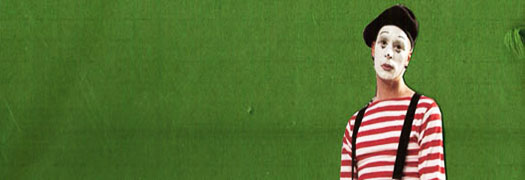
Features | Lists
By The Staff
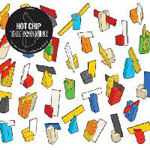
20 :: Hot Chip
The Warning
(Astralwerks)
I’ve been spanked in my life. I’ve been spanked so well that time became a mere illusion and the forces of good or the forces of evil spoke only the language of space and chronology in gelatinous man slap. That sounds about right, how I remember the true wallops I’ve taken in decibels of baby fat. The reverberation’s in me, however much hasn’t waned over the years. And I’m still spanked on occasion today—the abuse doesn’t lose step, the atavistic punishment doesn’t jar my biorhythm. I mean, I run miles to Hot Chip. I tone muscle and build mass and fucking propagate my species to Hot Chip. What do I get in return? A warning. A big dumb, octagonal sign that loudly reads, “Don’t Stop.” Don’t even let up — you huffing primate you, you tool. I’m compelled to shake what my mama gave me and then try harder and rupture what the Good Lord gave me. I’ve fallen, and I’ve gotten up; I’ve danced my pants off; I’ve been shown the money; I’m still big, and the pictures have growth hormone deficiency; I’m sssssmokin’, bitch, and electro-pop is my anti-drug; but then I tried to put Baby in the corner, and only Hot Chip could get her there and teach her to deal.
Unfortunately, it took Hot Chip an album and then some to fist off that kind of assured, precise clout. Art Brut, go get fucked, because Hot Chip is as serious as castration, able to fuse breakneck numbers about desperation in motion without laughing at (or hoping someone laughs at, wiggling rawk bullhorns) the genres of disco (right?), funk (sounds right), electronica (right), and shameless pop they’re simultaneously emulating and grinding to a point. Undeniably, the record’s a call to survival dressed in ephemera, which seems perfect amidst all the year-end bliss. Ipso facto, The Warning is cheese and crackers for the End Times, and maybe it could have been wine, too, if we weren’t all so busy sweating the ooze of pop culture tropes that course through this thing. I mean, “the smell of repetition really is on you?” I have little hope for a human race whose industrial stink can harden into a viscous, plodding beat. But I can easily champion the one album of 2006 that, next to Hell Hath No Fury, props robotic loafers under the stage of a new and fascinating Grand Guignol, refining all of our exhausted blood into a lubricant as shamelessly soulful as this—and as violent as something like “The Warning,” where our very limbs and heads are threatened for the good of inertia. “Over and Over” sets the pace, “Boy From School” reminds of the biology at risk everyday, and “Arrest Yourself” enjoys the duality of restraint and paroxysm to the extent of embedding a dominatrix’s order in the screeling chorus. “S-E-X-I-N-G” is right. God bless you, Hot Chip, for keeping me too motile to really notice whatever Xenocidal beating we’ve got coming.
Dom Sinacola
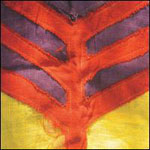
19 :: Yeah Yeah Yeahs
Show Your Bones
(Interscope)
A guy who was plugging his own band (nope, won’t mention the name, sucka!) sent a bunch of emails to the CMG staff in April detailing his thoughts on the state of music in 2006. Here’s what he had to say: “Long time reader. Kinda mixed feelings about music in ’06 … frustrated/burnt out. On pace to be worse than ’05. Tapes N’ Tapes is no Clap Your Hands. Islands are certainly no Unicorns … YYY’s/Flaming Lips /Strokes/Built to Spill … all major steps down.” His comments were more thought-provoking to me than he intended; I wondered then as I do now how useful it is to compare bands to other bands and, especially, to compare them to themselves. A top 50 list is a strange place to muse thusly, but it’s been a relevant line of questioning for me. All the blurbs I’ve written (this, Yo La Tengo, Walkmen) are for bands dealing with the crushing weight of their own back catalogue, perhaps none more so than the hypetastic Yeah Yeah Yeahs, who only have one other full-length. Yet among these bands, none delivered the goods better than Brooklyn’s hated triptych.
I’m not interested in why the Yeah Yeah Yeahs are such a polarizing band, and if you are one of the legions who hates them, then, please, move on down the list. This blurb will not convert you. Especially because with every listen this album makes me gush harder. “Gold Lion” stomps out the path that the album treads; it’s a slower and cleaner band, certainly, but also more engaging, sophisticated, quirky, and memorable. Of course, these adjectives can just as easily be used to describe the vocal performance of Karen O, who will always be the face of this band and its most immediate presence on record. The story of this album, for me at least, is the story of Karen O’s development as a front woman—a development that shows she knows when to wail, when to whisper, and when to shut the hell up.
Throughout the album she alternates between cocksure and vulnerable, harnessing both the power of Fever to Tell (2003) and the wistfulness of “Hello Goodbye (Adidas Version).” This is embodied in “Dudly,” where she takes a singsong melody and makes it at once an introspective lament (“Can’t even cope to make things last”) as well as a biting attack on a partner (“My dear you’ve been used / I’m breaking the news”). In “Fancy” her vocal is buried under distortion and guitars, giving the track a moody, dark feeling that leads nicely into the sexually charged (and begging for a remix) “Phenomena.” “Cheated Hearts” is predictably the standout for me, because besides being beautiful and full and generally lovely, it also shows an acute self-awareness of just how radically different this record is from their previous one. After the fantastic “taking it off” repetition that makes palpable the sexual tension, Karen O delivers a curious speculation: “sometimes I think I’m bigger than the sound.” As Sean noted in his review, Zinner responds with a riff that literally silences and dwarfs her. Bigger than the sound she is not, and that makes all the difference—both for this album, and the unfair expectations and hype that so many have attached to it.
Craig Eley
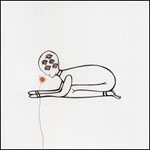
18 :: Figurines
Skeleton
(The Control Group)
OH SHIT! IT’S BUILT TO SPILL ON CRACK! AWESOME!
While the Real Doug released an album featuring a faux-salsa Santananza ’04 jam that ruptured my digesting dinner, these guys channeled that sound—that enthusiastic-to-be-hung-over-on-the-hardwood-floor wail—and built a huge, hooky, riffy, towering, beautiful, shocking motivating-to-get-out-and-run- around-the-park-twice-in-winter nothing out of a shitload of somethings gone by. And then they travelled from Denmark to the US to headline a tour and kids had the snots to leave after the openers, saying things like “Ha, we pulled a National.” The ipod doesn’t lie, jerks, and this was some staffer’s most-played of this year, and the fact that I got e-mails from concert-going friends about how everyone left after Tacky PR band of the week got their rocks off made me want to flying head scissors all of New York. But ok, I’m probably just making amends with the forksaken god of distilled indie rock (I, uh, walked out on the actual National, shut up) but that same, guilty, overstimulation-needing part of me (if your knee is ceaselessly bouncing up and down whenever you’re seated then you will love this record) needs this album like a consoling shoulder to lean on and bite: “It’s ok, I know what it’s like to live life like a wind-up time-machine.” “The Wonder” and “All Night” are straight from the canon and prove you can still write poetry with the most limited of vocabularies. But one of the most chilling moments of the year comes on “Release Me on the Floor” with its tortured soar and finishing flourish. And the best part is, I wanted to write about how the lyrics make a vague, opaque narrative about walking the line between being a walking party and apartheid of the sexes, but I can’t associate this record with anything other than manic, frantic energy, so there’s no sitting still long enough to go reference the liner notes. This is the most fun instance of a band’s self-defeat since “Float On.”
Aaron Newell
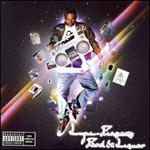
17 :: Lupe Fiasco
Food & Liquor
(Atlantic)
So this is what socially conscious rap can sound like. A decade removed from the break-up of Arrested Development (positive hippity-hop group, not sorely missed TV series), and all the better for it, big and glossy Food & Liquor is more the opposite of tight and ruinous Hell Hath No Fury than that Bob Dylan record adjacent; Lupe manages to say what so many of us heads wish we could say without coming off O’Reilly. If you’re hating on the second verse of “Daydreamin’,” please do tell me it’s the blatant sentiment that’s troubling gangsta you, not the execution. The flow is fluid, the rhymes’ satire on-point (“Now come on everybody, let’s make cocaine cool / We need a few more half-naked women up in the pool”), and Lupe drops just the right balance with his final flourish: “But I’d like to thank the streets that drove me crazy / and all the televisions out there that raised me.” By the way, that was me reiterating in case you didn’t catch Clay’s review. Which, maybe, you should catch.
Strange that the Neptunes’ two hottest creations this year exist in those contrary worlds: the cruel entirety of Hell’s kingpin bludgeons and the “Get By” kid sister (word to my boy Nool) of Food’s “I Gotcha.” I don’t know how it’s possible to make good on “Kick Push,” a hip-hop single about skateboarding, but I guess we’ll chalk it up as more evidence of Lupe’s unusual, self-validating talent. For me, though, the highlight might be “He Say She Say,” by far the most poised rendering of 1st and 15th’s Bacharachian production style; you can gripe about it basically having the same verse twice, but the subtle script flip between the voice of the mother and the voice of the son doubles the song’s entreaty to deadbeat dad in a way that’s both freshly conceptual and devastatingly affecting. I’ve been blessed with a happy home life, yet Lupe’s so adept at making the situation real to me, I feel like the song’s biggest fan.
Elsewhere (“The Instrumental”), Mr. Fiasco flaunts the ability to okay Linkin Park music, which reminds of patron Jay-Z, and that prepares you for Hov as guest, then maybe adds to the surprise when “Pressure” is the weakest song on the record (though post-Kingdom Come hindsight is all, “No shit”). Weakest track, not song, comes with Lupe aping mentor Kanye, or is it a law that big Chi-town rap debuts must end with interminable shout-out tracks that thank absolutely everyone? But, seriously, thank you, Lupe. Conscience has rarely sounded so sweet.
Chet Betz
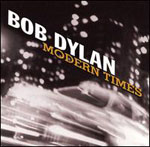
16 :: Bob Dylan
Modern Times
(Columbia)
Bob Dylan’s 32nd studio album, Modern Times, hit number one this year. This hasn’t happened for Dylan in thirty years, since 1976’s Desire, and has only occurred four times in his career. It’s been much remarked upon that Dylan, at sixty-five, is the oldest living artist to go straight to number one in the charts. So more than forty years into his career, what’s Dylan’s—and this album’s—appeal? First of all, it’s oddly seductive. Sexy, actually. What, you can’t imagine that the aging troubadour crooning about looking for Alicia Keys “clear through Tennessee” could be sexy? Sound a little more like creepy to you? Dylan’s more than aware that Modern Times rides the line between romantic and unsettling; he knows that an “old” man’s desire is nothing we know what to do with. Instead of mourning his mortal conundrum, though, he gets a kick out of sharing it. He’s got nothing to hide: “I’ve got the pork chops, she’s got the pie / She ain’t no angel and neither am I.” The loose jazz and boisterous blues, expanded on from 2001’s Love and Theft, provide the lush backdrop for Dylan to sing out his tales of longing, disappointment and love and his band’s so breezy and comfortable that many tracks stretch toward six minutes long. Dylan’s obviously addressing a love interest in these lyrics from “Spirit on the Water,” but he might also be asking the listener who’s written him off, if that’s you, to give him another shot: “You think I’m over the hill / You think I’m past my prime / Let me see what you got / We can have a whopping good time.”
Kate Steele
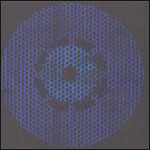
15 :: The Knife
Silent Shout
(Mute)
Aaron Newell (CMG): So, to escape Kent and radio alt-rock, do you guys go to extremes, like forming 29-piece indie pop orchestras that denounce the motherland?
Jens Lekman (JL): There is somewhat of a reaction to boredom, maybe, or just to “average.” About 3 years ago, around the time the Knife really broke here — and here I get the chance to talk about bands you should check — my Swedish label Service (www.srvice.com) was at the core of something like that in Göteborg. There was a band called the Embassy, and a band called TTA, the “Tough Alliance,” they all had the basic idea that they were tired of the way music was listened to, performed — you were supposed to perform a certain way, go on stage, play your songs, save your hit for last, go off stage for a couple of minutes, come back, thank the crowd, play a couple more songs, etc. You had to release records a certain way, too, and a lot of the Service bands wanted to turn things upside down, but at the same time release the most beautiful music.
CMG: How so?
JL: Well, sometimes I think things are different in Sweden…when I was in high school Morrissey was such a big character, he’s always been, the people who used to beat me up were Morrissey fans, the popular people listened to Morrissey and the Cure and Kent, and then they beat you up. That led me to listen to whatever was the opposite of that, and I think I came to the conclusion that our tradition of Eurodisco was the answer, and anything that was happy and stupid and danceable was the anti-drug to those people. And that’s the new scene in Sweden, everything is very disco-nightish, back from 1993….
CMG: Bringing disco back from 1993?
JL: It’s not American disco; Eurodisco is different, it’s a techno-disco scene, just fun, light pop music about nothing.
CMG: Around that time, if I remember correctly, Ace of Base had one of the biggest records in North America.
JL: Exactly, yes. But the Embassy took that and made something different again. They said they were tired of bands going on stage, playing an instrument for 45 minutes, doing an encore, saying “Hi Stockholm, how’s it going, this is our favourite city.” Sometimes they did conceptual stuff, and they weren’t even on stage, they’d be dancing and they’d have their own friend covering them, doing karaoke. And the Knife refused to perform live, until pretty much now. And now they do visual songs, they’ve got more of a performance-art show than a “concert.” The Tough Alliance just mimed to their songs for ten minutes, and then they’d start a riot or something. No one outside Sweden understands it and gives a fuck about it, but it all really has turned things upside-down here.
*****
My experience with this record went from “What an overrated mess” to “I should probably give this another shot” to “These lyrics and stories are fantastic once you get past the useless warped vocals” to “These tactfully-warped vocals are fantastic once you get past the tired electronics and weak drum machine percussion” to “These electronics are canned Can and expanded Kraftwerk resurrected by Keith FW and these drums are a killer beehive.” I know a lot of people that stopped at step one and wrote the record off and probably won’t ever pick it up again, which surprisingly happens a lot to bands that turn everything upside-down.
Aaron Newell

14 :: Belle & Sebastian
The Life Pursuit
(Matador)
Listening to The Life Pursuit for the first time felt like what I would imagine it would be to find out that Rocky Balboa, like, fucking rules. I had definitely counted them out, and deserved the kind of ass-kicking, brain-rattling, mat-hugging left hook this album delivered. In a sense, it confirms what we haters have been saying all along: Stuart Murdoch regains control of the band, and the result is their best record since If You’re Feeling Sinister. But The Life Pursuit is so thoroughly shot through with sunshine and goddamned genuine mirth that it felt much nastier than any obscene gesture ever could. I mean, I loved “Your Cover’s Blown” as much as anyone, but I saw them do a passable cover of the Bee Gees back in 2003; I wasn’t all that surprised. But if you told me that Belle and fucking Sebastian were going to try T. Rex (“White Collar Boy,” “Blues are Still Blue”) and pull it off brilliantly, I would’ve thought you were hallucinating, or at least that I was hallucinating you. But the joke’s on me, and Murdoch is screaming “Adrian” while the world cheers.
Christopher Alexander
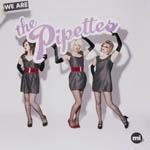
13 :: The Pipettes
We Are the Pipettes
(Vital/Memphis Industries)
“Set us a ship and we’ll man it, ‘cause we mean it.” This is how the Pipettes’ debut album starts, with a macho statement of purpose sung scornfully and without a hint of surrender. Gender-politicking aside (Newell’s review more than covered those bases), for all their polka-dot dresses and cute choreography, the Pipettes are not girly. They’re probably not even nice people: “Your Kisses Are Wasted on Me” and “One Night Stand,” bouncy as they may be, are more slaps in the face than kiss-offs. The three women sing with so much grit and strength that’s its hard to believe they’re aping the style of lovelorn ‘60s girl groups like the Supremes. Even when they’re singing “I can’t get over you,” they’re probably more concerned about the harmonizing, and rightfully so: the vocal arrangements of We Are the Pipettes are masterful. The group rips off doo-wop and Motown styles so shamefully and so effectively that you almost forget you’ve heard this sort of thing before; that’s because you haven’t, at least not like this. The rules may be the same (short, catchy, impossible to get out of your head) but the Pipettes are re-appropriating “My Girl” and “The Locomotion” for a song called “Because It’s Not Love.” It’s a whole new ballgame.
In one sense, the group’s shtick is ironic—forty years ago, they’d be singing “He Hit Me (It Felt Like a Kiss)” and really meaning that—but a lot has changed since then, whether or not a guy calling himself “Monster Bobby” is writing their songs. Of course, these tracks owe much of their power-pop kick to the unsung Pipettes, the four-piece male backing band (“The Cassettes”) that doesn’t even get to share in the group’s name. Gwenno probably vetoed it.
David Greenwald

12 :: Joanna Newsom
Ys
(Drag City)
It was too good to be true: five tracks stretched to super-epic lengths; production from Steve Albini; mixing by Jim O’Rourke, the man who, in the same role, carved Yankee Hotel Foxtrot (2001) into a modern classic; arrangements by Van Dyke Parks, for chrissakes—pretty goddamn exciting, and that’s forgetting the curious, idiosyncratic songstress behind the whole thing, and the fact that it hit the Internet in August, more a lightning bolt than a leak. The first time I heard Ys, it sounded like a thousand dreams come true. The recording redefined immaculate, turning Newsom’s harp into glisten and gloss and better, unveiling her once child-like voice as that of a newly confident adult. The songs, shockingly, were even better: Newsom always had a way with words, but the poetry and storytelling of Ys stretches from an Aesopian fable to contemplating God in the stars with her family to a doomed, desperate love without missing a stanza.
Still, I didn’t trust myself. Too many of my favorites, from Calexico to Akron/Family, had disappointed me in 2006. How could this vision of Joanna be any more than a mirage, a happy honeymoon with a heartbreaking comedown? Subconsciously, I looked for flaws and found them. Her voice was too idiosyncratic, switching from sweet croon to ugly grunt without warning or regard for my sensitive ears. Park’s arrangements were fluttering, needlessly busy affairs. The songs were too long. It was with this in mind, this mindless self-doubt, that I turned in my year-end list and turned my back on Newsom.
Then I saw her live, and every too-this and too-that went out the window. In a more visceral context, every apparent flaw made sense: her vocal shape-shifting simply paralleled her complex characters and narratives, Parks’ work matched the songs’ dramatic flair and as for the length, well, Newsom has a lot to say, musically and lyrically. In discussing Illinois (2005), Sufjan Stevens frequently referred to the “pageantry” of his songs, a quality that Ys, too, lives or dies by. But while Stevens used flash and theatrics to fill in the hollow parts of an admitted songwriting exercise, Newsom’s songs are built on uninhibited emotion and intimacy. Each moment of Ys bursts with reckless, gorgeous heart; more than any other album this year, it has made me a believer.
David Greenwald
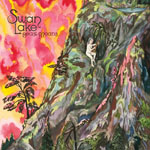
11 :: Swan Lake
Beast Moans
(Jagjaguwar)
Swan Lake is Frog Eyes’ Carey Mercer, Sunset Rubdown/Wolf Parade’s Spencer Krug, and Destroyer’s Dan Bejar. This trio of BFFs (the album is dedicated to “friendship, eternal and otherwise”; say it with me: awww) were borne under the much bolder, commanding moniker of Thunder Cloud, until legal issues forced a change. Having clearly learned their lesson, they instead opted for…the title of a world-famous 19th century ballet. Why not.
Songwriting duties are evenly split amongst the three, but Mercer—Krug’s early mentor and long-time collaborator with Bejar—emerges as the three-headed beast’s dominant personality, using the project as a chance to push his bandmates’ shared fascination with production space and mixed fidelity into a unique, atmosphere-focused bastardization of “indie rock.” In many ways, Beast Moans’s initially off-putting sound mirrors the surrealistic liner art by Shary Boyle: it’s a melting pot of free-floating vocals and condensed arrangements, all broad strokes of rattling echo chambers and trickling keys and scattered percussion, at times so thick and cavernous even Bejar and Krug have to leave self-referential breadcrumbs to find their way back out.
For the most part—Bejar’s self-devouring closer “Shooting Rockets” excluded—Mercer lays the aesthetic on thickest with his own material, resulting in a handful of beautiful, empirically overwhelming highlights like “City Calls” and “Pollinated Girls.” But it’s really on his comrades’ songs that the three come together the strongest as a group—usually in the subtlest of moments, like the bubbling keys and hissing, gaseous backing vocals that wrap up Krug’s incredible “All Fires,” or the spectral chorus on Bejar’s “A Venue Called Rubella”—and never just three of the country’s finest songwriters using yet another side project (this is what, fourteen for Krug?) to purge half-baked material in the name of friendship.





